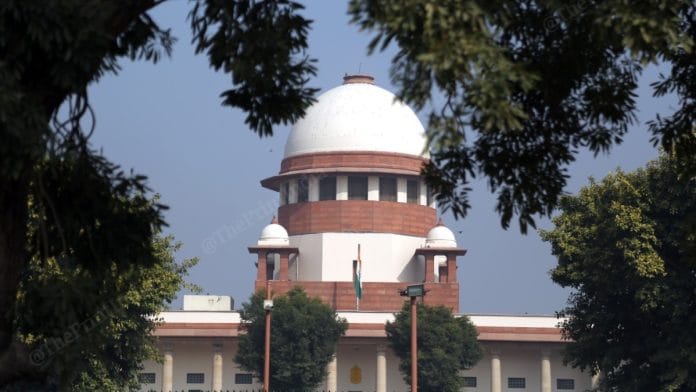New Delhi: Basing its decision on the controversial Citizenship Amendment Act (CAA), 2019, the Supreme Court has allowed the citizenship claim of a Hindu man who migrated from East Pakistan (now Bangladesh) to India in 1969.
The order comes even as more than 200 petitions challenging the validity of the CAA are pending before the apex court. The court has not stayed the implementation of the contentious law.
Referring to the provision added to Section 2(1)(b) of the Citizenship Act, 1955 by the 2019 amendment, a bench of justices J.K. Maheshwari and R. Mahadevan said appellant Basudev Dutta, a Hindu, would not be treated as an “illegal migrant”.
With this verdict, the court also set aside the Bengal government’s order to dismiss Dutta from service on account of him being “non-Indian”. The top court said Dutta would be entitled to receive all service benefits that were due to him.
“The intention of the central government to award citizenship to minorities from neighbouring countries has been spelled out by way of amendment to Section 2, by introducing [a] proviso in Section 2 vide Amendment Act No.47 of 2019 with effect from 10.01.2020, which states that the persons like the appellant herein are not be treated as ‘illegal migrants’,” says the judgment by the two-judge bench, written by Justice Mahadevan.
Notified on 10 January, 2020, the CAA was passed by Parliament on 11 December, 2019. The amendment relaxed norms for the grant of Indian citizenship by naturalisation to Hindu, Sikh, Christian, Buddhist, Jain and Parsi victims of religious persecution in Pakistan, Afghanistan and Bangladesh who came to India before 31 December, 2014.
On 22 January 2020, the Supreme Court had refused to stay the law and the National Population Register (NPR)—a database of Indian citizens—and said a five-judge bench might have to sign off on these issues. Acting on a government application, the apex court restrained all high courts from passing any order on the CAA.
Also read: How SC’s judgment on Section 6A of Citizenship Act 1955 could impact pending petitions against CAA
What is Dutta’s case?
Dutta worked as a paramedical ophthalmic assistant in under the West Bengal government. He was dismissed from service on 11 February 2011, just two months before his retirement, on the basis of a “secret report”.
Dutta challenged his sacking before the West Bengal State Administrative Tribunal, which allowed it in August 2012. The Calcutta High Court, however, set aside the tribunal’s order last August.
Dutta then challenged the high court order in the top court.
The state government argued before the Supreme Court that Dutta could not produce any document to prove that he was an Indian national except a migration certificate.
The government said this migration certificate did not recognise him as a citizen of India and that he had to register his citizenship with the authority concerned.
The state also said Dutta did not place on record the no-objection certificate that the state government had issued against his application for citizenship.
Describing him as a non-citizen, the state said he could not claim employment in a post reserved for Indian citizens.
But the top court said once an application had been submitted, the authority concerned had to take an appropriate decision “within a reasonable time by taking into consideration all the applicable laws and the documents produced by the appellant”.
The top court set aside the high court verdict, noting that if any document was relied upon to form the basis of inquiry, it must be furnished to employees. The bench said: “We have no hesitation to hold that the order of termination passed against the appellant is arbitrary, illegal and violative of the principles of natural justice and it cannot be sustained.”
(Edited by Tikli Basu)







WE DONT WANT ILLEGAL BITCHES, NO MATTER THE RELIGION.
Excellent decision by the Supreme Court. Kudos to the Justices!